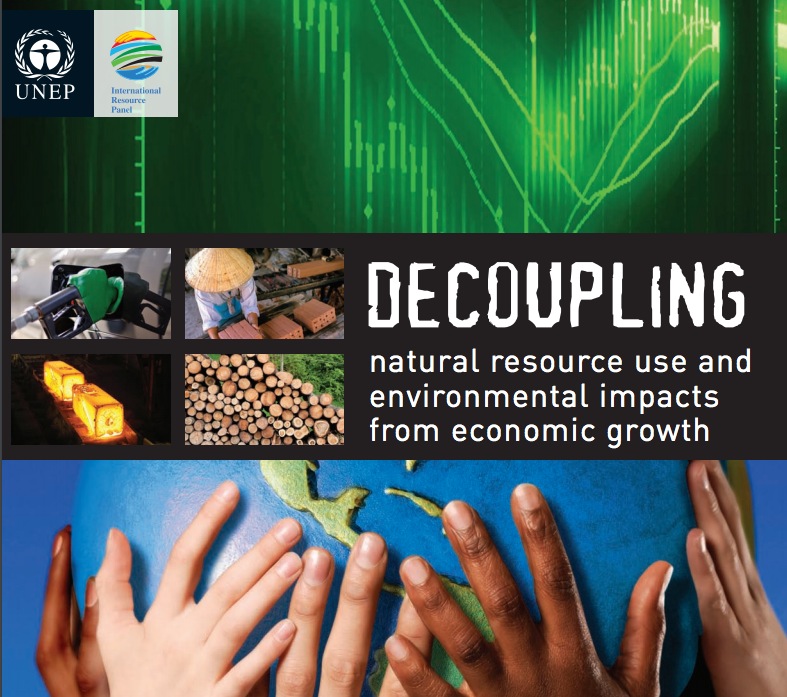By Robert Fletcher *
Decoupling offers a dangerous neoliberal fantasy that we can overcome environmental limits to indefinite economic growth.
It has been more than half a century since Frantz Fanon famously asserted that “what counts today, the question which is looming on the horizon, is the need for a redistribution of wealth.” The neoliberal project that engulfed the world since then can be understood in substantial part as an effort to prove Fanon wrong: to demonstrate that inequality could be addressed instead by growing the total economy such that everyone, ostensibly, could claim a reasonable share of it. In this way, as Foucault foretold, economic growth became neoliberalism’s “one true and fundamental social policy.”
This growth imperative would of course run up against increasing acknowledgment of fundamental environmental limits to such growth – leading to mounting calls for a transition to degrowth to which this blog has contributed. The neoliberal response to this has been to insist that growth can be reconciled not only with poverty reduction but with environmental sustainability too, by harnessing resource conservation as the basis of growth itself.
The latest strategy in this campaign invokes the curious concept of “decoupling.” Championed most strongly by the United Nations Environment Programme (UNEP) in a series of recent reports, decoupling is essentially the promise that sustained economic growth can be separated from natural resource extraction and the pollution it produces. The concept has been endorsed by UN Secretary General Ban Ki-Moon in his report heralding the new Sustainable Development Goals (SDGs), by celebrity economist Jeffrey Sachs, Ki-Moon’s key advisor on the SDGs, and by the Sustainable Development Solutions Network led by Sachs to oversee the Goals’ implementation. It has also been promoted by other influential organisations, including the Breakthrough Institute, Ecosystem Marketplace and New Climate Economy.

All signs, in short, point to decoupling becoming a central component of the renewed global development agenda. While this dynamic has already received some critical commentary it remains under-scrutinised given the intensity of its promotion.
What is “Decoupling”?
UNEP’s reports remain the most extensive discussion of decoupling to date. They start by explicitly acknowledging “the limits to the natural resources available to support human development and economic growth,” yet assert that growth is still needed to “to generate employment for the soon to be two billion people either unemployed or underemployed.” Hence, decoupling is advanced as “a necessary precondition for reducing the levels of global inequality and eventually eradicating poverty” while remaining within biophysical resource limits. Peter Hennike, one of the reports’ main authors, elsewhere states simply that “staying within ‘planetary boundaries’ is impossible without decoupling.”
The case for decoupling is grounded in a series of key conceptual distinctions. The first is between relative and absolute decoupling, the former designating a reduction in “the rate of use of (primary) resources per unit of economic activity,” the latter describing an overall decrease in resource use even as the total economy grows (UNEP likens this to the Environmental Kuznet Curve).

Source: www.eea.europa.eu
The second key distinction is between resource (i.e. input) and impact (i.e. output) decoupling, where “resource decoupling could be referred to as increasing resource productivity, and impact decoupling as increasing ecoefficiency.”

Source: http://synapse9.com
Third, UNEP distinguishes material from immaterial resources, the former being those “whose value is characterised by the qualities that render it useful for certain applications,” the latter those “whose use has no effect on the qualities that make them useful” (examples of immaterial resources include “the song of a bird inspiring a composer” and “the shine of a star used by a captain to find his way.”)
Finally, UNEP distinguishes economic from physical growth, the former designating an increase in GDP or similar measure of economic value, the latter the material inputs providing the basis for this value.
The goal is thus to promote “nonmaterial economic growth” – a dynamic termed dematerialisation. In this way, UNEP asserts, “it becomes conceptually possible for economic growth (defined now as money flow, or value) to be decoupled from physical growth of the economy (resource consumption) and associated environmental pressures.” More than this, however, ecological economist Paul Ekins is cited to suggest that decoupling in fact opens the “theoretical possibility of GNP growing indefinitely in a finite material world.”
This is an extraordinary statement, tantamount to negating the limits to growth position entirely. Yet in its subsequent analysis, UNEP undermines its own case for this potential.
First, the reports admit, “the conceptual framework for decoupling and understanding of the instrumentalities for achieving it are still in an infant stage.” Empirically, meanwhile, “it is methodologically very demanding to measure impact decoupling.”
What limited evidence for decoupling that does exist, moreover, appears less than promising. In particular, “absolute reductions in resource use are rare . . . they can occur only when the growth rate of resource productivity exceeds the growth rate of the economy.” Even in places where some relative decoupling seems to have occurred, this may be offset by “a shifting of the material and environmental burden into developing countries” through offshoring production.
Moreover, apparent decoupling may be further offset by “a ‘rebound effect,’” also known as the Jevons Paradox, in which “efficiency gains in resource use may paradoxically lead to greater resource use.” In sum, UNEP admits, “breaking the link between human well-being and resource consumption is necessary and possible but in reality is hardly happening.”
These difficulties are compounded when politics enter the equation. UNEP envisions a “tough contraction and convergence [that] would keep global resource consumption at its 2000 level, but redistribute the resources so all countries achieve roughly the same per capita metabolic rate.” Yet it acknowledges that this scenario “would be unlikely to be politically acceptable” and thus “can hardly be addressed as a possible strategic goal” even while it “would not lead to an actual global reduction in resource use” anyway.
A Dangerous Fantasy
While asserting the necessity of dramatic decoupling for any hope of genuine sustainable development within a growth-dependent economy, in short, UNEP simultaneously admits that: 1) there is virtually no evidence that decoupling works; 2) the conceptual basis for even imagining it is weak; and 3) even if it were possible it would be politically infeasible.
Paradoxically, UNEP subsequently claims that even though overall resource use has risen dramatically worldwide “some decoupling of resource use from economic activity has taken place: the world economy has been dematerialising.” In this statement, astoundingly, intensified resource extraction is reframed as evidence of dematerialisation itself!
It is on such confused and convoluted premises that our (neoliberal) hopes for a sustainable future rely. Decoupling offers a seductive fantasy of economic expansion without end. As with most fantasies, however, it is sustained by disavowal – a simultaneous admission and denial – in that even its most enthusiastic supporters all but acknowledge that the likelihood of achieving it are virtually nil.
This fantasy’s grave danger lies in the a priori counter-argument it offers to the urgent need for transition from an economy predicated on continual growth to one based in degrowth. And of the widespread redistribution that this would necessitate to address social inequity alongside resource degradation. As Sachs’s Solutions Network asserts:
There are many pessimists regarding decoupling who feel that the only way to limit resource use is to limit overall economic growth. We disagree. Decoupling has not yet been tried as a serious global strategy….
Promotion of decoupling, from this perspective, requires not evidence or even coherent conceptualisation but merely faith in its potential – faith that cannot be contested until the project has been rolled out and evaluated. By then, of course, we may not have much of a planet left to sustain.
* Robert Fletcher is Associate Professor in the Sociology of Development and Change group at Wageningen University in the Netherlands. He is the author of Romancing the Wild: Cultural Dimensions of Ecotourism (Duke University Press, 2014) and co-editor of NatureTM Inc: Environmental Conservation in the Neoliberal Age (University of Arizona Press, 2014).






Nice job, well put Rob. !
Dear Dr. Fletcher,
Thanks for writing the post. I have become a skeptic of sustainable development. For sustainable development, both improving efficiency is just as important as respecting physical limits (scale or size). Efficiency (or intensity) refers to resource consumption and/or waste generation per unit of GDP or capita. Size/scale refers to overall magnitude of the resource consumption and waste generation. In simple terms, efficiency reveals quality of development (relative decoupling) while scale indicates quantity of development (absolute decoupling).
Given the size of our economy and Jevon’s paradox, I do not think that efficiency gains alone can save our planet. We need to reduce consumption and waste generation in absolute terms. But, absolute decoupling as you rightly pointed out is still a fantasy without degrowth. We do not have any evidence of it. Economic growth itself mean resource consumption. So, I am doubtful that absolute decoupling is physically possible.
However, respecting physical limits require substantial sacrifices that almost no one would be willing to make. If you remember, G.W.Bush senior said that “American lifestyle is non-negotiable”. Therefore, suggesting that technology will solve all of the problems without us making any sacrifice on our standards of living has become a favorite arguments of almost every decision maker. Idea of decoupling, mainly from technological solutions, offers politicians a safe refuge from asking tough questions and telling people the truth about limits to growth.
Currently, most of the debate is focused on using technology to solve problems and strive for more growth. Even many genuine experts continue to promote technology driven solutions to environmental problems without any regards to absolute scale. In my opinion, this is dangerous and distracts us from asking right questions regarding true meaning and better understanding of sustainable development.
Thanks,
Sourabh
Dear Robert,
I just stumbled across this blog, and was interested to read your article on decoupling. I share your concerns on the issue. Thank you, I will be looking more often at Entitle 🙂
With some colleagues we have just published an article in Sustainability on the topic, which might be of interest to you: http://www.mdpi.com/2071-1050/8/6/517
We applied expost analysis to some efficiency/decoupling policies to add some evidence to the debate.
I have similar worries about the circular economy which is being widely promoted by politicians and innovative businesses. The risk with both of these concepts, despite their strengths, is that consumption can be re-framed as a positive ecological act. What we urgently need (at least in wealthy nations) is an honest discussion at the science interface on how to keep consumption acceptably within social and environmental limits. Unfortunately, at the political level it is unthinkable to tell people they should have less. Interests rates are rock bottom and the shops stay open. Tricky situation. One step in the right direction could be to promote well-being (beyond GDP etc), and encourage individuals to recognize that they can be much happier living frugal healthy lives and smiling more often…
Thanks again! Have a great weekend
JP